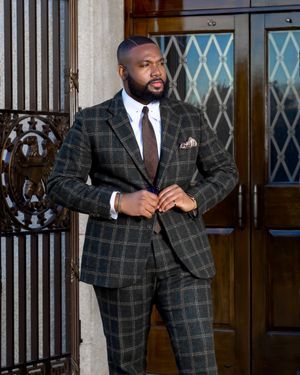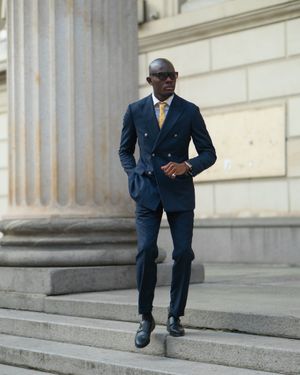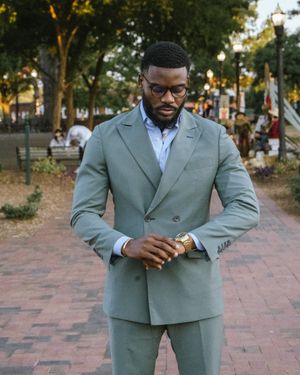This article is your go-to resource for mastering the art of footwear selection when preparing for important job interviews. We'll explore the importance of shoe color, discuss classic and unconventional choices, and offer actionable advice for coordinating your shoes with your interview outfit. Whether you're navigating industry standards or ensuring your shoes shine, let us be your trusted companion in crafting a polished and professional interview look.

Understanding the Significance of Shoe Color
In the realm of first impressions, every detail counts, including the color of your dress shoes. Understanding the psychology behind color choices can help you make a statement without saying a word.
First Impressions and Color Psychology
Color psychology reveals that different hues evoke varied emotions and perceptions. In interviews, the goal is to convey professionalism, confidence, and reliability. Professionalism is often associated with colors like black, navy, and charcoal gray, conveying seriousness and authority. Confidence can be subtly projected through bold colors like burgundy or deep blue, while reliability can be communicated through neutral tones like taupe or tan, symbolizing stability and dependability. By balancing these qualities in your attire, you can make a memorable impression and enhance your chances of success in the interview process.

Create Your Custom Dress Shoes
Classic Color Choices and Their Impact
Black Dress Shoes: The Safe Bet
Black dress shoes, including oxfords and derbies, are widely revered symbols of elegance and formality, making them the preferred choice for conventional interviews and industries with conservative norms. Their timeless appeal effortlessly aligns with the expectations of professionalism and seriousness commonly found in traditional interview settings and corporate environments.
When to Opt for Black Shoes
In fields such as law, finance, or corporate environments, opt for black oxford dress shoes for a dependable and anticipated choice, perfectly harmonizing with the professional ambiance. Their ubiquity in these industries reflects their ability to convey a sense of seriousness and adherence to traditional norms, making them an ideal complement to formal interview attire.

Create Your Black Oxford Shoes
Brown Dress Shoes: Versatile and Warm
Brown shoes add a gentle warmth and versatility to your outfit, making them suitable for a wide range of interview settings. Brown loafers and brogues are a good choice, as their earthy tones exude approachability and flexibility, making them an excellent choice whether you're interviewing in a corporate environment or a more creative field.
Matching Brown Shoes with Outfits
In less formal or creative fields, brown shoes, such as loafers or brogues, emerge as versatile companions, effortlessly harmonizing with a myriad of wardrobe choices. Whether paired with a classic navy suit, charcoal trousers, or earth-toned separates, brown shoes exude an air of approachability while retaining a refined aesthetic. This adaptability allows for a seamless transition from formal to semi-formal settings, enabling candidates to convey professionalism without sacrificing personal style.

Alternative Colors: Navy and Burgundy
For individuals aiming to infuse a touch of individuality into their interview attire while still maintaining a sense of sophistication, navy or oxblood dress shoes present an enticing option. These unconventional hues provide a subtle yet stylish departure from the traditional black or brown, allowing candidates to stand out in a tasteful manner. Navy shoes offer a refined alternative that pairs well with a range of outfit choices, from classic suits to more contemporary ensembles. On the other hand, burgundy shoes exude a sense of confidence and creativity, making them an excellent choice for those seeking to make a memorable impression in creative or non-traditional industries. By incorporating navy or burgundy dress shoes into their attire, candidates can demonstrate their willingness to embrace innovation while still adhering to the expected standards of professionalism.

Creative Fields and Less Formal Interviews
In dynamic sectors such as marketing, design, or startups, where creativity and innovation reign supreme, the choice of unconventional dress shoes offers a powerful statement of one's willingness to challenge norms and think outside the box. Embracing styles beyond the traditional oxfords and derbies signals a candidate's ability to push boundaries and offer fresh perspectives. Opting for unique styles like loafers with bold colors or wingtip brogues with unconventional materials can underscore a candidate's creativity and readiness to embrace unconventional ideas, perfectly aligning with the innovative spirit of these industries. By daring to depart from the expected, candidates showcase their readiness to embrace change and drive innovation in their professional endeavors, setting themselves apart as forward-thinkers in a competitive landscape.
Matching Shoe Color with Industry Norms
Corporate vs. Creative Sectors
When selecting the color and style of your dress shoes, it's crucial to consider the prevailing industry norms. In corporate environments, adhering to tradition by opting for classic black oxfords or derbies is often the safest bet, as it aligns seamlessly with the expected standards of professionalism and formality. However, in more creative sectors, such as design or advertising, there's often greater latitude for experimentation with footwear choices. Here, embracing diverse and unconventional styles like monk straps, Chelsea boots, or loafers in addition to bold colors or unique designs can be not only acceptable but also celebrated as a reflection of individuality and creativity. If you are a recent graduate and new to the business fashion scene, understanding and respecting these industry-specific norms, can effectively tailor your attire to make a favorable impression that resonates with the expectations of your chosen field.
Researching Company Culture
Ahead of your interview, it's essential to conduct thorough research into the company culture to gauge whether a more traditional or contemporary approach to dress is appropriate. Pay attention to cues from the company's website, social media presence, and employee testimonials to discern the prevailing dress code and cultural norms. For organizations with a more traditional ethos, such as law firms or financial institutions, a conservative and formal attire is typically expected. Conversely, in industries like technology or creative agencies, a more relaxed and contemporary dress code may be the norm. By aligning your attire with the company's culture, you demonstrate your respect for their values and fit seamlessly into the organizational ethos, increasing your chances of making a favorable impression during the interview process.
Tips for Coordinating Shoes with Interview Attire
Suit and Dress Shoe Combinations
Ensuring that your shoes complement your interview attire harmoniously is essential for making a polished impression. For a classic look, pair black shoes with charcoal or navy suits, as these colors create a timeless and professional ensemble. Conversely, brown shoes can add warmth and depth to lighter-colored suits or separates, such as beige or light gray, striking a balance between sophistication and approachability. By thoughtfully coordinating your shoes with your outfit, you demonstrate attention to detail and a keen sense of style, enhancing your overall presentation during the interview.
Business Looks
Get inspired
The Role of Accessories in Your Look
Accessorizing your outfit with items like belts, ties, and pocket squares offers an opportunity to inject personality and flair into your look. Coordinate these accessories with your shoe color to achieve a cohesive and polished appearance. For instance, if you're sporting black shoes, consider pairing them with accessories in bold or contrasting hues to add a pop of color and visual interest. On the other hand, if you've opted for brown shoes, complement them with accessories in warm, earthy tones to create a harmonious and well-coordinated ensemble. By experimenting with different colors and textures in your accessories, you can showcase your individual style while still maintaining a professional and put-together look for your interview.
Maintenance Tips for Impeccable Presentation
Polishing and Cleaning Before the Interview
Prior to your interview, invest some time in polishing and cleaning your shoes to ensure they are in impeccable condition. A well-maintained pair of shoes not only enhances your overall appearance but also reflects your meticulous attention to detail and commitment to professionalism. By presenting yourself with neatly polished shoes, you demonstrate to your potential employer that you value quality and take pride in your appearance, setting a positive tone for the interview.
Long-term Shoe Care for Continuous Use
To prolong the lifespan of your dress shoes and keep them looking sharp for future interviews and beyond, it's essential to invest in quality shoe care products and establish a regular maintenance routine. Regular cleaning, conditioning, and polishing not only enhance the appearance of your shoes but also protect the leather from wear and tear. By dedicating time to maintain your shoes, you can ensure they remain in excellent condition, projecting professionalism and attention to detail in all your endeavors.
Video Interview Preperation
While selecting the color of your shoes may seem like a minor detail in the context of a video interview, it's crucial to remember that presenting yourself well from head to toe is always essential. Choose attire that reflects the company culture, opting for business casual or formal outfits depending on the industry. Select solid, neutral colors as they appear best on camera, avoiding busy patterns. Ensure your clothing is clean, wrinkle-free, and complements your background. Pay attention to grooming and minimal accessories, aiming for a clutter-free, well-lit space for the interview. Test your outfit and background in advance to ensure a polished appearance from head to toe. By dressing thoughtfully and professionally, you'll present yourself confidently and make a strong impression during your video interview.

This guide serves as a valuable resource for refining your footwear choices when preparing for significant job interviews. We've delved into the significance of shoe color, explored a range of classic and unconventional options, and provided practical tips for coordinating your shoes with your interview attire. Whether you're navigating industry norms or aiming to make a lasting impression, consider this your go-to source for crafting a polished and professional look. Armed with these insights, you're well-equipped to exude confidence and make a memorable impact on your career journey.
FAQs: Dressing for Success
Q: Can I wear brown shoes to a job interview?
A: Yes, brown shoes can be appropriate for a job interview, depending on the industry and the formality of the interview. In more casual or creative environments, brown shoes can convey professionalism and style. However, for conservative fields or formal interviews, black shoes may be a safer choice.
Q: Are black dress shoes the most formal option for interviews?
Generally, yes. Black dress shoes are considered the most formal option for interviews and formal business settings. They offer a classic and timeless look that pairs well with most suits and conveys a sense of professionalism and seriousness.
Q: How do I match my dress shoe color with my suit?
When matching dress shoe color with your suit, consider the formality of the occasion. For formal events or interviews, black shoes are typically the best choice for charcoal, black, or navy suits. Brown shoes, on the other hand, pair well with lighter-colored suits such as beige, tan, or light gray. The key is to create a harmonious and balanced look that complements your attire.
Q: What do different shoe colors say about my professional appearance?
The color of your shoes can subtly convey different messages about your professional appearance. Black shoes are often associated with formality, professionalism, and authority. Brown shoes can convey warmth, approachability, and a more relaxed demeanor, making them suitable for less formal environments. Ultimately, choosing the right shoe color depends on the impression you want to make and the context of the situation.













































